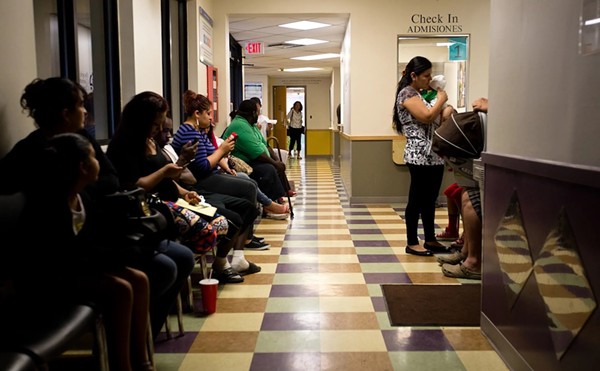"Flexible choice" bill could hurt the poorest of the poor
Proposed changes to federal housing law have raised fears in San Antonio over the future of Section 8, a program that covers a portion of the rent for low-income families or individuals.
The State and Local Housing Flexibility Act, known in the U.S. House as HR 1999 and in the Senate SB 771, proposes changes to how housing authorities administer Section 8; the legislation also limits the eligibility of its potential recipients. Meanwhile, it leaves in place current funding structures, which many housing advocates say are flawed.
The Section 8 Flexible Choice Voucher program is funded by the U.S. Department of Housing and Urban Development and serves approximately 2 million families and individuals nationwide, including nearly 12,000 in San Antonio.
The Flexibility Act ostensibly promotes self-sufficiency by limiting the time that voucher holders, with the exception of the elderly and disabled, can participate in the program. Under the act, voucher holders could be enrolled for only seven years; currently, there are no time limitations. And, where the program previously required 75 percent of Section 8 families to earn no greater than 30 percent of a city's median income - in other words, the very low-income families - the Flexibility Act raises that requirement. If passed by Congress, the law would require that 90 percent of those served have gross incomes that do not exceed 60 percent of the median income. In effect, that would make more people at higher income levels eligible for the program.
According to U.S. Census figures for 2002, the latest data available, the median household income in San Antonio is $36, 700, which means an equal number of households earn more and less than that amount.
Housing Advocates, such as the National Low-Income Housing Organization, worry that these changes will leave the nation's poorest citizens exposed by shifting funding from the poorest of the poor to those who need less assistance.
Others are concerned that the Flexibility Act does too little, establishing a funding formula that last year turned local housing authorities on their heads, and delaying the ability of housing advocates and policy makers to discuss the formula for two years.
"Overall, our biggest concern about the bill relates to renewal funding," said John Bohm, spokesperson for the National Association of Housing and Redevelopment Officials. "Agencies need a stable funding formula that they can count on from year to year, so that they can plan."
Section 8 provides low-income families and individuals with vouchers that are used to pay a percentage of their rent, based on income. Last year, for the first time HUD based its Fair Market Rents, or the maximum amount a voucher holder can pay for an apartment or house (including the cost of utilities, except telephones), on the 2000 Census. It used a new methodology to determine that amount, averaging a city's rents with that of its suburbs, where rents are often much cheaper.
Meanwhile, HUD changed the way it funded the program. Previously, Section 8 tenants contributed 30 percent of their rent; the federal government covered the rest. Last year, HUD funded housing authorities in a lump sum based on the average cost of vouchers in 2003; in San Antonio this resulted in a decrease in funding from $80 million to $72 million. `See related story, "Slashing Section 8," November 4-10, 2004`.
Bohm says these changes continue to cause turmoil around the nation, where local housing authorities have had to make retroactive budget cuts, to lower rent payments on existing vouchers or, in some cases, terminate vouchers. As a result, landlords and affordable-housing developers have left the program.
Both the National Association of Housing and Redevelopment Officials and SAHA say they support aspects of the bill that simplify cumbersome laws and regulations that govern how the worth of each voucher is calculated, which is based on the income of the recipient. "It leaves flexibility at the local level, as to how they want to administer the program," says Melanie Villalobos, San Antonio Housing Authority spokesperson. "Local authorities may decide they want to keep administering it the way we do today, which, frankly, is very formulaic and prone to math-based, human error."
Villalobos says that housing authorities are considering assigning a flat value to the vouchers based on the size of the housing unit. "So, it doesn't matter what your income is," she says, "Your choice of apartment or house is based on what you can afford above the voucher. This takes all the formulas out of the picture and is much less labor-intensive."
For some, this could be good news; for others, it could be bad. Villalobos says the Flexibility Act would force local housing authorities to make a tough decision: Do they pay a smaller portion of Section 8 rents and serve more of their city's poor, or do they assist fewer, their city's most vulnerable families, with greater subsidy?
Villalobos emphatically states that this is a question SAHA has "no desire" to answer without more input from the community. Should the bill pass, SAHA plans to hold public meetings and brainstorming sessions with elected officials and the community to determine what is best.
Bohm says he doesn't expect "expeditious passing" of the Flexibility Act given the issues and outstanding questions associated with the bill and how the proposed changes will be administered.
"We are cautious about saying too much about how negatively it may effect folks; we don't want people to get worried," says Villalobos, "but we have been saying, 'This is coming and we all need to get ready to make these decisions.'" •
By Susan Pagani

















